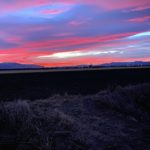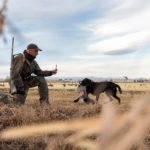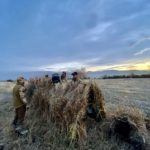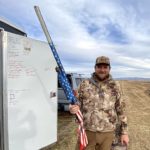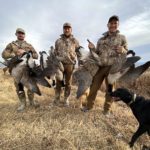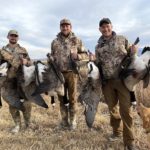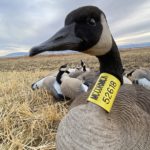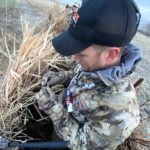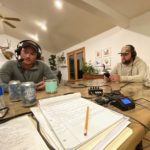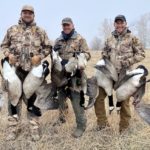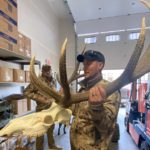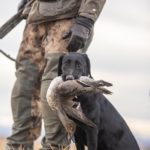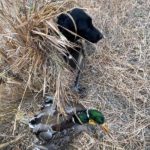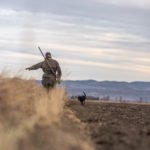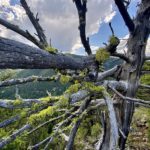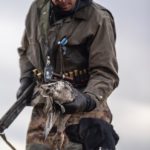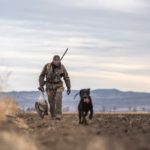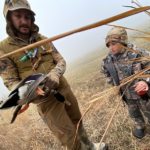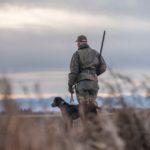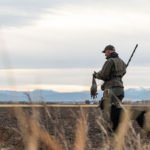Matt McCormick and Brady Davis invite Ramsey Russell into their wheelhouse of Gallatin River Valley Canada goose hunting near Bozeman, Montana. The local waterfowl culture is all about big honkers and ducks over local grain-fields, but pretty much takes a backseat to big game hunting, fly fishing and other plentiful outdoor activities. Following a pound-sized moose burgers supper and cold beer, they soon get to the heart of things. See, nobody comes to Bozeman by accident, and once there, few people ever want to leave. How’d Matt and Brady get started hunting and what lead them to Bozeman? What’s the Canada goose hunting really like in the Gallatin River Valley? Why can Bozeman, Montana be described as a perfect balance of hippies and cowboys? Is it more about making a living or making a life? You decide. Matt and Brady are highly entertaining and articulate, and the 3 buddies find serious common ground well beyond waterfowl. For those that listen closely, this fantastic episode even provides solid direction for pursuing career opportunities “in the hunting industry.”
Canada Goose Hunting and The Bozeman, Montana Lifestyle
There’s a country music song, by a singer named Cody Jinks, called “Hippies and Cowboys.” He talks about raising hell with the hippies and the cowboys. That’s exactly what I feel like Bozeman, Montana is. It is a cowboy town full of hippies, hunters, fly fishermen, and skiers. It’s got all types. – Brady Davis
I can see it. Bozeman’s a prime example with the massive growth. All these people coming from the outside, coming in. They’re all coming on a whim. None of them are coming for jobs. Lot of them are coming for lifestyle and are going to figure it out from there. – Matt McCormick
Ramsey Russell: Welcome back to Duck Season Somewhere podcast. I am in the Gallatin River Valley of Montana, not too far from Bozeman. Today’s guests are Brady Davis—the world-famous Brady Davis—and Matt McCormick. How are y’all doing?
Brady Davis: Doing good, man. How are you?
Ramsey Russell: Good.
Matt McCormick: We’re great.
Ramsey Russell: Good. Introduce yourselves. I know who you are, but introduce yourselves to everybody else. Just take turns. Who are you?
Brady Davis: Go ahead, Matt. You can start.
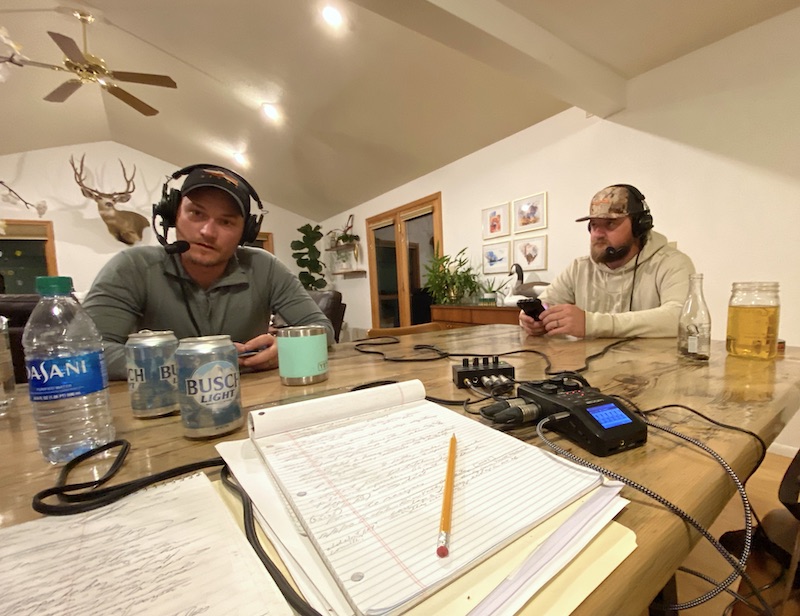
Montana Goose Hunters, Matt McCormick and Brady Davis
It was right then and there, for me, that I knew that this was it.
Matt McCormick: Matt McCormick here, in Bozeman, Montana. Photographer. I work with SITKA Gear and a handful of other companies. We’re goose hunters, man, here in this valley. We’re excited to be here, and happy that you’re here with us.
Ramsey Russell: Y’all are goose hunters. You were saying last night that, given a choice, you’ll never go after a duck.
Matt McCormick: Yeah. I would say that, in general, if we have the choice, we’re going to pick geese over ducks. Yep. There’s some instances where we can run traffic on ducks or geese and kind of pull them both in, but, for the most part, we’re targeting geese, man.
Ramsey Russell: Does that go back to your origins of being born and raised in Wisconsin? Because that’s kind of goose country.
Matt McCormick: It’s definitely goose country, but you run into a lot of duck hunters out there. They got a pretty good flyway through there. For me, I think I just fell in love with goose calling, goose hunting, and it’s just stuck with me ever since. It’s just kind of been my one fast-track. Haven’t really turned back from that.
Ramsey Russell: What about you, Brady?
Brady Davis: So, I moved to Bozeman six years ago now, but in 2004 my wife and I moved to northern Colorado. I was managing a horse ranch there, and we had a couple hundred acres of corn and different crops under pivot. When I was managing this ranch, I just was watching geese land in the fields. I grew up a hunter, but I did not grow up a waterfowl hunter. Growing up, my dad would take us hunting, but it was like mule and horse pack trips in the backcountry for deer and elk and things like that. Then, me and my buddies in high school got into the hound dog game, and I was into hunting mountain lions and bears and bobcats and coon hunting. I mean, we did some jump shoots and stuff in high school. Everybody’s got a farm pond. We’d see ducks in there, and we’d go jump shoot them, shoot some ducks. But I did not grow up a waterfowler.
Then, when I moved to Colorado and watched all those geese fly into a field—man, I got the bug. I remember I ran down to Sportsman’s Warehouse, one day, and bought a Jeff Foiles “Fallin Skies” goose hunting video. Came back, threw that sucker in the DVD, and watched that for about an hour and a half. Was just fired up, and went straight back to Sportsman’s Warehouse. Bought some BigFoot decoys, a dozen. I also bought a Zink Power Clucker. A Poly Power Clucker.
Matt McCormick: The Poly Power Clucker. Off the wall.
Brady Davis: Oh, yeah. $25 bucks or something.
Matt McCormick: They were an awesome call, too, and they were small, so you could fit them in your hand real nice.
Brady Davis: Yeah. It was great. I actually still have it. But I learned how to do the most basic cluck ever, and I took those decoys out a couple days later. I laid underneath a bed sheet. It was snowing. Laid underneath a bed sheet in that field and started making some awful-sounding clucks. Some geese were flying, and, sure enough, I had a group come and center up on me. The limit was three, at the time, and I remember clear as day: I had wind at my back, and these geese just came straight in. I sat up, went, “1, 2, 3,” and tripled.
I remember I was about three hundred yards from the barn my wife and I were living in. There was a big barn with an apartment in it. I grabbed those geese and went hauling butt back to the barn, just pumped out of my mind. She’s like, “Well, it looks like you killed some geese.” It was right then and there, for me, that I knew that this was it. After that, I started actively getting out of the hound dog game. A year and a half later, I had a Labrador and a bunch of decoys, and was going at them hard. I love duck hunting, as well, but the truth is I kind of cut my teeth in this world on Canada geese. That’s really what I want to hunt.
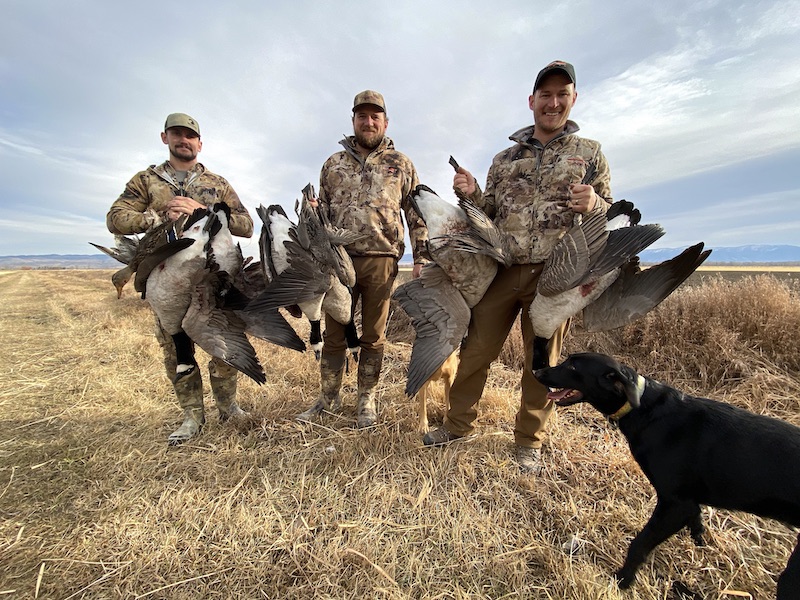
Learning to Call Canada Geese
I really wanted to learn how to goose hunt, but, mostly, I wanted to learn how to goose call, moreso than to goose hunt, to begin with. – Matt McCormick
Matt McCormick: I have a question. Where did you learn to call? How did you learn to call? Did you just pick it up and start blowing it like an instrument and figure it out yourself?
Brady Davis: Nope. When I bought that call, there was a CD that you could listen to. So I threw that sucker in the truck, and it was just talking about how to blow the call.
Matt McCormick: Was it Field or Freddy?
Brady Davis: Honestly, I don’t remember, man. I don’t even remember.
Matt McCormick: I can’t remember either, if that was Field or Freddy doing those at that time. I want to say it was Field.
Brady Davis: I don’t even remember the names. I remember the very first nice goose call I ever bought, after that, was a Zink Money Maker. That was Field’s call that he had won a bunch with. Chartreuse. Oh, that sucker was a beauty.
Matt McCormick: That was the only one they made it in.
Brady Davis: I know. I remember I bought that call—and this is at a time in life when my wife and I had no money. We were like newlyweds, babies, the whole shebang. I’m running a horse ranch. I don’t remember what I paid for that call, but I want to say it was like $100.
Matt McCormick: It was probably $150.
Brady Davis: Maybe, yeah.
Matt McCormick: You probably told her $100.
Brady Davis: I probably told her it was even less than that, but yeah. I remember buying it, and I got it at the call counter, which is backed by the guns, and then you had to walk up to the front. I remember carrying that thing and just like, “Man. Rent? Money Maker? Rent? Money maker.” Bought it. I was pumped on that. That was the first nice goose call I ever owned. After that, man, it was all goose hunting. In northern Colorado—for anybody that’s ever hunted there—there is an enormous amount of geese there. Doing the horse thing, I just knew a lot of people with horse properties. Farmers, etcetera.
Matt McCormick: The right people.
Brady Davis: Was able to get into some spots and learn how to run traffic on Canada geese. It was awesome. So, yeah, I did not do a lot of duck hunting.
Matt McCormick: It’s interesting you talk about the call wall. When I was in my senior year in high school, I worked for Sportsman’s Warehouse. I was working behind the gun counter, and, naturally, the call wall was something that was a big attraction for everybody at that time. You’d have the calls in the case—and that was something everybody wanted to look, feel, touch, and blow—but they would always pull them off the wall. I remember when I first heard somebody blow on a goose call—like an actual short-reed, at some level of goose calling—it sounded like a bunch of geese. We were at a store set at Sportsman’s Warehouse, and a guy by the name of Scott—uh, something, I can’t remember his last name for the life of me, right now—he was blowing on a Half Breed. He was all the way across the store and the store set. I remember hearing that, and I’m just like, “How the hell does he make that thing sound like that many geese?” That was kind of when I just picked up and was like, “I need to figure this out.” I went up to him. Asked him what he was blowing. He said, “This is Tim Grounds’ Half Breed, but you don’t want to learn on this one. Go ahead and pick yourself one up off the wall.” I grabbed a Big River Flock Talk, and I grabbed the Shaun Stahl’s “Honker Talk” DVD. Those two things were like the gateway into where we are today. Without those two, who knows?
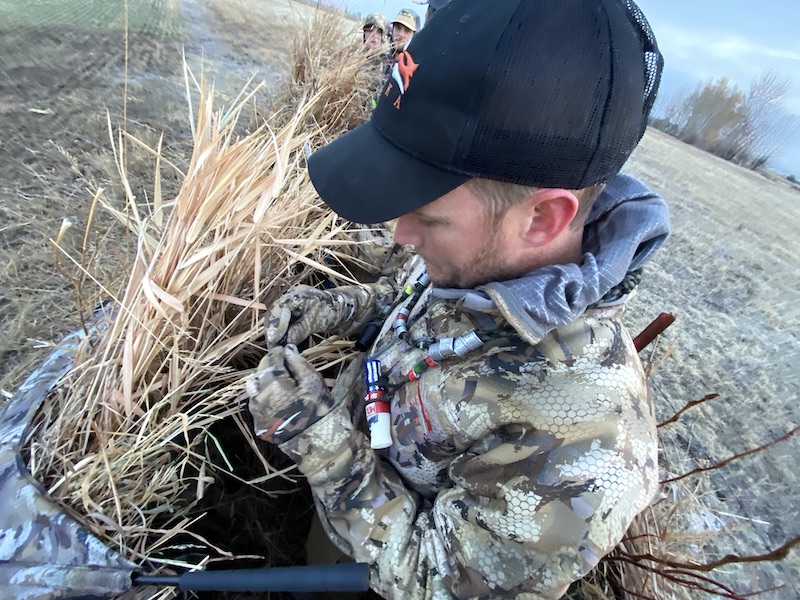
Ramsey Russell: How long ago was that?
Matt McCormick: For me, that would have been 2003. Yeah, 2003.
Ramsey Russell: You’ve come a long way since then, listening to you in the blind this morning.
Matt McCormick: Yeah. Yeah, we’ve had some good training. From there—once I figured out how to make that first noise—I was able to meet some of the right people. We had talked about this a little bit, but it’s interesting how—when you get something in your mind and that’s the path you want to go down—how you’re able to find that path and move your way through the crowd to figure out your destination.
I really wanted to learn how to goose hunt, but, mostly, I wanted to learn how to goose call, moreso than to goose hunt, to begin with. Just by doing that, you start talking to people, you start meeting people, and I was able to get introduced—from a friend of a friend of a guy that knew a guy—to a good goose hunter who might be interested in helping me out. His name is Randy Suther. He is still, to this day, probably one of the best goose hunters that I’ve met, and I’ve met a lot of guys. He was able to kind of take a young buck under his wing and bear with me through the adolescent phase that I was going through in the senior year of high school and into college.
Brady Davis: Smelled bad, for sure.
Matt McCormick: Oh, yeah, and I was always late.
Brady Davis: You don’t say?
Matt McCormick: He didn’t have anybody else that could hunt everyday. He set up his life perfectly for goose hunting. He was full-time, lifetime military. Got a job as an Outagamie County officer on patrol. Second shift. He’ll probably hate that I’m saying this—he could patrol every night and then hunt every morning, which was perfect. So he could hunt every day, and I could, too, because I had nothing going on. We just became pals, and he taught me how to call. It was a really cool, long-term, progressive learning curve as I got through the notes and through the cadences, and worked with him and Saunders together. It was really an almost serendipitous moment when he was like, “All right, you’re ready. Let’s do a contest.”
I go. I start blowing in some contests, had some success, won a couple. We get to the Wisconsin State Goose Calling Competition, and Randy and I decide we’re going to blow in the contest together. Against each other, as competitors, but we’re a team. He’s older than me. At the time, I was 16, 17, 18, somewhere in there. He was 35, 36, 37, somewhere in there. Yeah, right in there. We both made it to the third round, and wouldn’t you know it? That bastard beat me in the third round and ended up winning the competition. I would have never saw it coming. He says to me, right before, he’s like, “Hey, I’ve been working on this goose routine. You want to hear it?” I’m like, “Yep.” I listen to it, and I’m like, “You’re going to do the old T. Rex?” He’s like, “Well, I just don’t think they’ve heard that before.” I don’t know if you know what the old T. Rex is. It’s a call that originally came out on one of the “Bad Grammar” DVDs. Threinen was talking about it. It’s like a really long, drawn-out buzz with two quick spits at the end. Nobody does that now. He was going to pull it out in the state competition. He’s like, “I got nothing to lose. I’m the underdog here,” and he’s a damn good caller. Sure as shit, he pulls that thing out, and he ends up winning the whole damn thing. I couldn’t have been more proud of him.
Brady Davis: That’s awesome.
Matt McCormick: It was just really cool.
Life Changes and Moving to Bozeman, Montana
One day, I just quit my job. Within five days, I packed my truck with everything I had. Basically a goose cart with six dozen Dave Smith lessors, one X-Land’r blind, an 870 gun, and whatever else I could fit. – Matt Mcormick
Ramsey Russell: How did y’all both end up here, in Bozeman? I’m going to break and say that at some point in time in history, Bozeman was just a sleepy little cowboy town. It’s not anymore. I was with a mutual friend of ours, Redbeard, this summer, going down one of the rivers in his boat. Y’all call him Tex; I call him Redbeard. Ryan Yarnell is who we’re talking about. He described—you got this perfect combination of people in the Bozeman area. You’ve got the old folks that were here, just country and ”rednecks,” I’d call them. That’s what we call ourselves, back home. Then you’ve got some other folks that have come in that were looking for a little bit different ideal, or something. It just made the perfect—boom, they just blended together. There wasn’t any conflict, it just took off. To me, Bozeman is such a cool area. If I had moved out here, at some point in time when I was younger, I would have never left. It’s a beautiful country. It’s a great city. What led y’all here? Because most people here, I’m thinking, came from somewhere else. How did y’all end up here, in short?
Brady Davis: It’s funny you bring up that analogy. There’s a country music song, by a singer named Cody Jinks, called “Hippies and Cowboys.” He talks about raising hell with the hippies and the cowboys. That’s exactly what I feel like Bozeman is. It is a cowboy town full of hippies, hunters, fly fishermen, and skiers. It’s got all types. Personally, I grew up in a family where my dad hunted a little bit, like I said, but my dad’s passion was really fly fishing. I grew up in Utah. We came up here sometimes on vacations, and we’d go fly fishing in the Madison River, Yellowstone River, whatever.
As I got a little bit older, I was really involved in rodeo. I had come up here for a lot of rodeos and things, and travelled around doing that. Man, I just had it in my head, from my early teenage years, that if things went well in life you’d end up in Bozeman, Montana. I remember, as a kid, all the time I’d tell my dad or anybody, “Yeah, I’m going to live in Montana.” Every single time I would say that, people would say, “Well, the only problem with Montana is, you got to figure out how to make a living. There’s not a lot up there.” I just had it in my head that I was going to figure out how to get here. My wife and I got married real young, and we lived in Colorado and South Carolina and then Utah, again, and now Montana. I have a funny story for you.
When we were first newlyweds, we were in college. I was probably 22, she was 20, and we went to school one day. Both of us. We carpooled to college together. It’s kind of a long story—I won’t get into it now—but I ended up dropping out of school that day. At 10:30 in the morning, I left a business law class and, literally, went down to the admissions office and pulled out. It was kind of a tricky deal for me because I was there on a full-ride rodeo scholarship, but I dropped out. I remember I called my wife on the cellphone, and I said, “Hey. What are you doing?” She said, “Well, I’m in class.” I said, “Well, I just dropped out of school.” Then I said, “You ought to do the same.” She said, “Okay.”
Sure as shit, she drops out the same day. We had this old, extended cab, old, old Dodge Cummins pickup with a flatbed on it. She said, “What do we do now?” I said, “Well, we got about $300. Let’s go to Montana.” So we drove back to our house—now it’s like 11:00, 12:00—and we loaded up some bedrolls and a cooler. We didn’t have any money, so we’re going to camp out and cruise around Montana. I had these two Catahoula cow dogs. We loaded them on the flatbed. That was back in the day when you could just put a dog on a flatbed and drive down the interstate. We went to Montana, and, man, we stayed up here for eight or nine days. Just cruised around and camped.
We spent a lot of time in Dillon and around the Big Hole River, up in like Wise River and Wisdom and that area. I remember just telling her, “I don’t know how we’re going to do this, I don’t know when we’re going to do this, but we are going to end up in Montana.” She was all in and super game. Seven, eight, nine days into that trip, I looked at the bank account. I think I had about $60 left, and I calculated the diesel fuel costs to get back to Utah. We kind of had to cut the trip short, at that point, because I said, “Honey, we gotta get home. We’re going to be broke when we get there, but we’ll be there.” We came back. Ever since then, it’s just always been a thing for us. So six years ago, when the opportunity came up, it was kind of a no-brainer to come here.
Ramsey Russell: How about you, Matt? How did you end up out here from Wisconsin?
Creating a Career Path in the Hunting Industry
“People are expecting me to be hunting, but I’m being torn. Family, personal life, work, all this stuff.” What really stuck out to me is, “People are expecting me to be hunting.” I didn’t know what that meant, but I really was interested in it.
Matt McCormick: It was a long road to get here. First, started out in Wisconsin. Left there. Moved to southern Idaho, kind of that south-central Burley area. Egg country, down there. I had hunted down there a handful of times and really just fell in love with the hunting. Had some friends down there, knew some people, was kind of ready to get out of the Wisconsin scene. One day, I just quit my job. Within five days, I packed my truck with everything I had. Basically a goose cart with six dozen Dave Smith lessors, one X-Land’r blind, an 870 gun, and whatever else I could fit. Some clothes. Put it in the back of the truck and headed west without even a plan.
Really nowhere to live. I knew some people, but— Just making calls on the way there, letting them know, “Hey, I’m on my way, and guess what? Oddly enough, goose season starts in about two weeks, so let’s just go ahead and start scouting. I need a scouting route.” I got out there. Did that deal for about four years, working on and off and doing as much hunting as I could. Loved the hunting down there. Completely different than what I had ever done. It’s truly Western-style Canada goose hunting down there, for sure. Lots of short fields: beets, potatoes, winter wheat cover crop. That’s it. All field-edge hunting with big groups of geese, and they’re a little bit smaller than the geese here. It’s the same goose, but it felt like it was a little smaller goose.
I’m working through that deal, navigating that deal—love taking photos, at the time. Kind of piqued my interest. I sold some photos on consignment, over there at the local gift barn, with this gal. She was slinging photos for me. She’d make a little cut. I’d take a photo of a bee on a flower, or something, and she’d sell it to somebody. I just really liked it, and it was something that I wanted to do more of. But I didn’t really know how to navigate the industry. I didn’t know how to navigate, “How do I do this for a living?” I remember I picked up a new lens while I was there. I think it was like a 55mm—or 18mm to 55mm, something like that—and I started taking some photos. I jumped on the Refuge Farms. You remember the Refuge Farms? I was on there a ton.
Ramsey Russell: Oh, yeah. Wow. What was your handle?
Matt McCormick: Matt BS. Yep. It’s a great handle. It was like a Bill Saunders thing.
Brady Davis: That’s going to be your new nickname. Matt BS.
Matt McCormick: Yeah. Some of y’all may remember me.
Brady Davis: Tomorrow morning at 5:30, I’m going to be calling you that.
Matt McCormick: Yeah. I mean, the Refuge Forums chatroom was a thing. That was like the thing.
Ramsey Russell: Oh, it was a thing.
Brady Davis: Yeah. A lot of drama, on there.
Matt McCormick: Yeah. I knew a lot of the guys that were causing it, and it was great. I love chirping people on there and just watching people get into arguments about all sorts of things just like they do now on Instagram, Facebook, all that. But I didn’t have Facebook, back then. I did, but didn’t use it. Instagram wasn’t a thing. The only way you could keep in touch with people—the only way I knew to navigate the industry—was go through the Refuge Farms.
“How do I do this?” I remember jumping in there and putting some photos up. They used to have a photography thread in there, and I remember jumping in there and posting some of my photos and being like, “Hey guys, what do you think about this? This is really fun.” And just getting my ass reamed by people. Just like, “You don’t know what you’re doing. What you need to do is put down that camera and get a job.” That’s basically what they’re telling me, and I’m just a kid. I had just gotten some fresh snowshoes—
Ramsey Russell: And they’re the “experts.”
Matt McCormick: I’m out just walking around in the mountains, just like, “Check this out!” Then I got guys just—ruthless. Ruthless feedback. Which was good for me, at the time. Like, “Okay, well, I guess I got something to learn.” So I just started digging and diving, trying to figure that out. Things weren’t really working out in Idaho the way I wanted them to. I did a job up in Billings working construction. We were working on the Pompeys Pillar, which is out of that Billings area. Did you ever go there?
Ramsey Russell: I passed by, yeah.
Matt McCormick: You should stop in there sometime. It’s the last standing evidence of the Lewis and Clark expedition. Clark’s name is in the sandstone, right there, and it’s all covered in glass and everything. Yeah, it’s pretty cool.
Ramsey Russell: That’s crazy that he thought to sign his name.
Matt McCormick: Yep. So we were there on site doing some work, and we were staying in Billings. We were here for two months, and I got to meet some people in Montana. I was like, “This is a place that I could like. These are way more my people, than these people in southern Idaho.” Nothing against the people in southern Idaho. They’re just not like me. I just kind of said to myself, “I want to figure out a way to get to Montana. There’s nothing holding me down here. Hunting’s great. There’s got to be hunting up there. Let me just see what I can find out.”
I ended up watching a film called “Searching for West” which is a sick, kind of dramatized documentary around a guy by the name of Mark Seacat—who’s from Helena, but lives in Bozeman—talking about the struggle of becoming a new father but also having all of these personal goals with elk hunting, and all these things. It’s just this constant battle, and it’s this back-and-forth pull. It was brought to you by SITKA Gear, which was super cool. It was the first of its kind in the hunting industry as a whole. Still to this day, I would say it’s, arguably, one of the best hunting films ever made, especially because of the time that it was made.
“If you want to learn how to do this—you come up here, you show up—there will be a desk for you. You can come up here and learn. See what we do. Come hang out, have fun, figure this out, and work for me.” For no money, of course, but it was a great opportunity.
I watched that, and I showed it to a few of my friends in Idaho. There’s a one specific moment in that film where Mark, in his voiceover, says, “People are expecting me to be hunting, but I’m being torn. Family, personal life, work, all this stuff.” What really stuck out to me is, “People are expecting me to be hunting.” I didn’t know what that meant, but I really was interested in it. Like, “What does that mean? Does that mean that family is expecting you to be hunting?” It didn’t really seem that way. It seemed like, professionally, people are expecting me to be hunting. I wanted to learn more, so I reached out to him on Facebook. I jumped on Facebook, reactivated my account, reset the password. I’m like, “Okay, I’m back online.” I looked him up, sent him a Facebook message. We swapped numbers, and we got on the phone and started talking. One thing kind of led to another. He was telling me about some internships that he was offering for the summer.
At the time, I was planning on doing something else, photography-wise, kind of setting my own thing up down there in Idaho. He’s like, “If you want to learn how to do this—you come up here, you show up—there will be a desk for you. You can come up here and learn. See what we do. Come hang out, have fun, figure this out, and work for me.” For no money, of course, but it was a great opportunity. Fairly low risk for him, but he offered the opportunity up. Like, “If you get here, you can test your luck. Let’s see what you got.”
Within a week, I again packed my truck with everything I had. Moved to Bozeman. Called one of the guys that I knew worked for him and told him that I was coming. I ended up staying in the basement of a house with four or five guys. Lived on a couch for four months with a stack of clothes and a bag of decoys. Just kind of went to work, man. Learned how to do it and started just figuring out the area.
Ramsey Russell: That’s the great thing about being young. What do you have to lose?
Matt McCormick: I had nothing to lose.
Ramsey Russell: We were talking on the drive back from your house about that quote from Henry David Thoreau. “Most people live lives of quiet desperation” because they’re scared to just take a chance and go sleep on a couch and learn something.
Matt McCormick: Yeah.
Ramsey Russell: Maybe. I would think so. See something. See a world bigger than their backyard.
Matt McCormick: Yeah. I feel like there’s people that are becoming more accustomed to that type of change, right now. I’m feeling that. I can see it. Bozeman’s a prime example with the massive growth. All these people coming from the outside, coming in. They’re all coming on a whim. None of them are coming for jobs. Lot of them are coming for lifestyle and are going to figure it out from there. Yeah, that’s what got me here, man. I said I wanted to find a way to get here. Mark offered me the opportunity. I jumped on it and worked hard. Ended up figuring out a way to make it happen, man.
Ramsey Russell: What happened after that? Where did you go from there? You took the internship, and it evolved into a job at SITKA, or?
Matt McCormick: Yeah. Basically what happened was, there were six interns that came in, and I was one of them. There was one job available. He was looking to hire somebody. Full-time social media management, photo-taking, the whole nine yards. Everything SITKA was doing in those days, which was leading the charge on creative, authentic commercial photography.
Ramsey Russell: The internship was almost like a live interview.
Matt McCormick: Yep. I’ll say this to anybody—that team, and me included, were a part of the front end of this whole thing that we’re experiencing right now. It was just a rad group of guys, man. It was like a frat house in there. Because I had moved from Wisconsin to Idaho, I had been adulting for like four years. Trying to figure it out—work, play, hunting, and everything else. Getting back up here, it was just like, “Man, I missed out on some life. Let’s just go ahead and do this party thing again.” It was just so damn fun, man. We just had a great time, and I got along with everybody. Kind of found my niche in waterfowl.
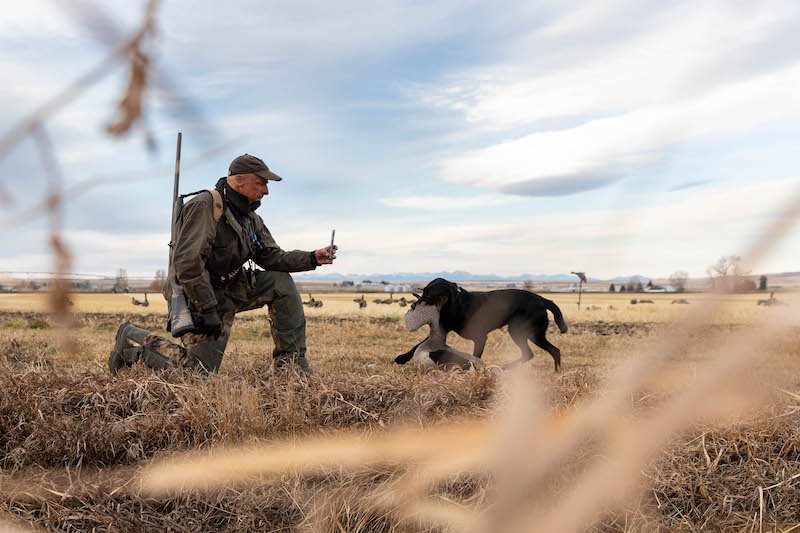
Matt McCormick: SITKA had just launched their waterfowl pattern, and they didn’t have anybody taking photos. It just kind of seamlessly worked for me—to be able to get in there and kind of show what I had—because they didn’t have anybody else doing it. Just started taking photos, man, right here in Bozeman with the pals. Scouting hard, finding birds, getting permission, and doing the deal. Taking photos the whole way. Through that, started meeting people and started doing a little bit of traveling. SITKA was paying for it. We were all working together. We were all doing cool shit, all the time, and all working together to get better. The whole goal was like, “We are going to continue to lead this charge, and we’re going to be the best there is. We need to work as a team to do it.” That led into a job, when I finally ran out of money. I just told Mark, “I got to move back to Idaho because I need to find a job.” He offered one up to me, and I stayed.
Lived on that couch for another three months or so. During that time, met my now-wife, Camille. She and I have been together ever since. Yeah, so if you fast forward from there: I split from SITKA in 2015. Just different focuses—I wanted to go hard, so I quit there and just started kind of knocking down the doors that I could, building that network throughout the last few years. Just started making those phone calls. That slowly led to where we’re at today. What seemed like very slowly. A lot of hard work, just over and over and over. Just stay in the field, keep photographing, keep calling, keep doing the work, and keep trusting yourself and working hard. Yeah. And now we’re here.
Brady Davis: One of the most fun seasons ever—by the way, as a side note—was when Matt quit working for SITKA and was kind of doing his own thing, and I was here. He basically quit his job, and so he had nothing going on. It was phenomenal because my job—in the winter, I’m wide open. Goshdamn, we hunted a lot that season. Like every day. There was never a day that I’d call, “You want to hunt?” “No, I got to work.”
How Start Goose Hunting Together?
Ramsey Russell: How did y’all meet? Scouting geese, or what?
Brady Davis: That’s a funny story, too.
Matt McCormick: It’s a good story. For me.
Brady Davis: It’s a good story. Yeah, it still is kind of a burr under my saddle, actually, how we met. Back then, that would have been 2015, huh? ‘14, ‘15.
Matt McCormick: Yeah, somewhere in there. It must have been summer of ‘15.
Brady Davis: Jim Saubier from SITKA Gear—who’s the guy that develops all the gear—he was having, basically, a little waterfowl summit-type get-together. He had a handful of hunters there, brought in some guys from around the country. I was here. Ted Wells. McCormick was here. It was just kind of a couple days to get together and run through gear and, basically, give Jim feedback on SITKA Gear. And just hang out and get to know each other. It was a lot of fun. We actually would come and hang out, we’d party at night, and we’d go in the office and go through all the gear and tear it up. Well, Jim is a big sporting clays guy. Skeet, trap—sporting clays. He had set up this sporting clay shoot just out west of here. We were in the office, then we were going to go out that afternoon. All of us, we were going to go shoot sporting clays. Well, keep in mind, you’re in a room with five, six, seven of us, and everybody’s bowed up at this point, right? You’re going to go shoot sporting clays. Nobody’s saying it verbally, but the truth is we’re all kind of sizing each other up and trying to see like, “Man, I hope this goes well. I don’t want to look like an idiot, etcetera.” So we get there, and I remember, as soon as we started shooting— There’s a guy named Cody Tanks who’s a really, really good shooter. Probably one of the best shots I’ve ever seen.
Matt McCormick: Yeah. National Champion.
Brady Davis: And Ted Wells. Those two quickly pulled ahead. They were the two that were not ever missing. Then there was me and Matt behind them, kind of running neck and neck. Again, I didn’t really know Matt, but we’re kind of running neck and neck.
Matt McCormick: Jim behind them, kind of all on his own.
Brady Davis: Yeah, Jim was doing his own thing. Then dead last was Ricky Hart, from Lucky Duck. He’s going to love that I bring that up, by the way.
Matt McCormick: Well, we’re just telling the truth.
Brady Davis: Yeah, he’s going to say, “Well, it wasn’t my shotgun,” and yada yada. Anyway, so you get in that situation—and I’m hyper competitive, and so is Matt—so we’re kind of shooting neck and neck through this whole thing. I’m thinking, “The only thing I got to do today is just beat Matt McCormick.” So we’re shooting, we’re going through the rounds. Again, it’s neck and neck. I’d be up a couple, he’d be up a couple. Then we get down to the very end, and it’s like a dead-nuts tie. In the end, Matt beat me by one clay. To this day, it chaps my ass. Every time it comes up, I still hate it a little bit. But that’s how we first met, and then as we were talking and getting into—
Matt McCormick: Ted ended up winning.
Brady Davis: Ted ended up winning, yeah. He beat Cody, which was awesome. Ted is a really, really good shot. But then as Matt and I got to talking—we were there for the waterfowl thing. He was talking about goose hunting, and that was really, honestly, the only thing I cared to talk about, either. That’s kind of how Matt and I met. I figured he wanted to just hunt geese. He just kept talking about wanting to hunt geese, and that’s really all I was here to do, is hunt geese. We started hunting together and have been hunting together ever since.
Goose Hunting in Montana
How is Canada goose hunting in Montana different?
Ramsey Russell: Talk about goose hunting here in the Gallatin River Valley, because we talked about its depth. We did some today. How is it different, for example, than Canada goose hunting in Wisconsin or Colorado?
Matt McCormick: Yeah. I would say that it is very different than hunting in Wisconsin. I would say that it is marginally different than hunting in Colorado.
Brady Davis: I would agree.
Matt McCormick: In Wisconsin, you have the shortgrass prairie geese that are very aggressive. They move through the flyway very quickly. I’ll go out and say that the peak of their season is in October. It’s one of the only ones that like October. In Wisconsin—especially anywhere from the fields of Green Bay, all the way down to the Horicon Marsh—late October into November is like, “Game on.” Those geese are just moving fast. They’re moving fast. They’re getting a lot of cold that’s pushing them. They’re getting a lot of strong North winds. They’re feeding really aggressively. They’ve got to go a long way. So you have really aggressive geese. They’re really loud, and they’re smaller. In Colorado, you get a lot of the same Canada Geese (Westerns) that we get, but they also get spill-over from South Dakota, so you get a lot of small geese too. I’m sure you’ve hunted there.
Ramsey Russell: Oh, yeah.
Matt McCormick: There’s two things about Colorado. One thing: there’s a ton of geese, right? There are so many geese on the Front Range. That also brings a lot of hunters and a lot of pressure. A lot of outfits. It’s been commercialized for a really long time. As long as I can remember, at least.
Brady Davis: It was before I even started in 2004.
Matt McCormick: Yeah. So that type of hunting—because of the leasing, because of the amount of people, because of the clientele and the club members and all that stuff—they hunt a lot of pits. Those pits are—although in similar crops that we’re hunting up here—they’re set up perfectly. It’s almost all pit hunting. Every hunting that I’ve ever done has been out of pits, up there. I know there’s probably some other stuff in there, but—
Brady Davis: Yeah. Definitely when you’re hunting with an outfitter, I would say there’s a lot of pits. All the good feeds in Colorado are leased fields. So hobby hunters and weekend guys that are hunting are almost exclusively running traffic. In that situation, we’d be in layout blinds or rough hunting or whatever you were doing. Really, when I was hunting there, it was running traffic because everything else was leased. All the good stuff was leased up.
Matt McCormick: Were you hunting on the field edge?
Brady Davis: I was hunting on the field edge most of the time, yeah. I tried everything. Again, I didn’t really go into it with a mentor to walk me through it, so there was a ton of trial and error. I had no idea about big geese and little geese, and I remember, at first, thinking, “Gosh, there’s just geese everywhere. I can kill these big buggers, but these little geese are just wearing me out.” Could not figure out how to kill those little geese. Finally, after hunting with some other guys and starting to figure it out, I started increasing the decoy spread and learning how to run traffic on lessers. That changed a lot, but it’s still very different than hunting here.
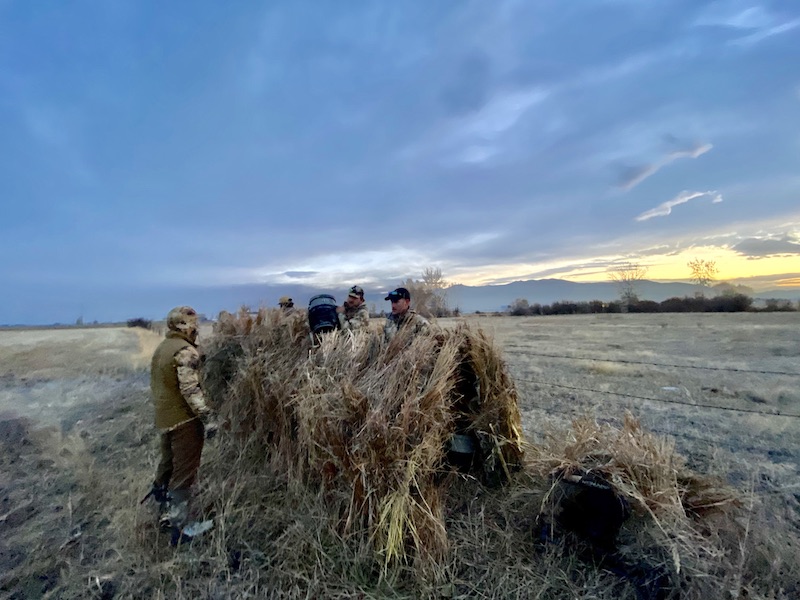
Matt McCormick: Yeah, same goes for Wisconsin. Going back to that, real fast—a lot of that stuff is small fields. Fairly small. What I would consider as small. Under three hundred acres. And a lot of corn. So you have in-field hides a lot of the time. There’s so much corn, and there’s a lot of combine corn, and they go to a lot of no-till because of the shale and all that stuff. You just have some really good hides. You always have wind, and it’s almost always out of the northwest. It’s great. It’s fantastic.
Brady Davis: Were you in layout blinds?
Matt McCormick: Out in layout blinds exclusively. Yep. You’d hunt some chisel-plowed stuff, and that stuff is always challenging for everybody. We’d be out there with a gallon jug of water and a bucket and a broom. You’re just mixing mud and trying to mud up your blind to match that dirt from the field that morning. You’re out there way too early. If the sun shines, you’re kind of screwed. If the clouds were there, you could set off the decoys. You could probably do it as long as you didn’t have a shadow. That was just really different than hunting in Idaho which, like I mentioned, is what I would consider true Western-style Canada goose hunting. Which is short fields; again, main crops are beets, potatoes, cover crop of some sort of winter wheat, and now here we’re hunting barley. That’s our four crops. Every once in a while, we get some peas. Sometimes they’re in the alfalfa pasture in the winter, when it gets real cold, for loafing. But for the most part, those are the four crops we’re hunting. Because of that, those are all really short fields. A potato field when it’s harvested looks like dirt. A beet field when it’s harvested looks like dirt. When they do a cover crop on it with any sort of winter wheat, it looks like dirt with perfectly-drilled rows of green which you cannot replicate. Then barley that’s cut like today: two inches tall and laid over. You just cannot hide in the field. The style of hunting changes really drastically from small fields, where you can hide pretty much anywhere in any wind— See my story’s putting Ramsey to sleep.
Ramsey Russell: No.
Brady Davis: I think those moose burgers are putting Ramsey to sleep.
Ramsey Russell: Yeah. Those bam-bam moose burgers.
Brady Davis: Oh, man.
Canada goose calling style in Montana?
It is far less aggressive of a goose. Sometimes you gotta get hot and heavy with them just to get them to turn around the edge, or sometimes they get out and you need them to swing…You need to pull them up the field—just like anything. You increase that momentum as you need them to do what you need them to do. It is more of a finessed style of calling
Matt McCormick: Small fields, where you can hide in any wind because you can hunt in the middle and have a layout blind, to big fields—320 acres or bigger, for the most part—and you can’t hide in the middle, so you have to hide on the edge. What that does to the style of hunting is, it forces you to rely on very strategic decoy placement, and calling. They have to come to the call. You have to hunt them with the call. But they need to see your decoys.
Ramsey Russell: More aggressively, or less aggressively, than Wisconsin?
Matt McCormick: Far less. Far less aggressive. It’s funny. When I go back to hunt with my mentor Randy, who I mentioned earlier—I’ll go back there, and he’s a traffic hunter. He traffic hunts those birds coming out of town. He gets under them. He hunts them in a pea field or a cornfield, just gets under the line and works his ass off. I go back there, and I call. He’s like, “You’ve lost it, man. Those Western geese have made you soft.” I’m like, “I’m doing the best I can, man.” He’s like, “You’ve lost it. It’s all right.”
Brady Davis: My ears are popping, here.
Matt McCormick: He’s like, “It’s all right. You don’t have to do it. You’re hunting those big geese.” It is far less aggressive of a goose. Sometimes you gotta get hot and heavy with them just to get them to turn around the edge, or sometimes they get out and you need them to swing, or whatever the case may be. You need to pull them up the field—just like anything. You increase that momentum as you need them to do what you need them to do. It is more of a finessed style of calling, especially when they’re working. We deal with a lot of no wind. That just adds a whole new aspect to an already really challenging hunt. The goose wants to be in the middle of the field because he has a ton of predators here, and so you’re trying to pull him to the edge with your decoys and your calling. Which is hard enough. Then he has no wind to center up, so he just skirts your edges.
The quintessential Bozeman, Montana, goose hunting experience
Ramsey Russell: That’s what surprised me because when I think of being out West, I think of gale force winds. But I guess it’s because we’re here in this valley. This morning, we had a two to four mile an hour wind, and y’all are like, “Oh, this is normal.”
Matt McCormick: Yeah, and that was a lot.
Ramsey Russell: We’re lucky to have it.
Matt McCormick: Yeah, except for it was in the wrong direction. It’s so hard to predict the wind around here. Every little bit counts. A little bit of south, southwest, all of a sudden changes everything around the edge. When you’re on the edge, you can’t move. You can’t turn the blind. You can’t do anything. You are stuck.
Brady Davis: Especially when you’re hunting a field where you have permission, and you can’t necessarily turn around or put decoys on the other side. If the wind changes, you’re stuck to that field
Matt McCormick: Or it’s plowed to heck like today’s was. We couldn’t put decoys on the other side. They’d have never seen them.
Brady Davis: Yeah.
Ramsey Russell: No, they’d never have seen them.
Brady Davis: And there was no edge, really. You have to figure out your edge. Figure out the wind—which, again, we rarely have any. We also—I would say most of the time—hunt sun and no wind. So you have bright sun and frost.
Matt McCormick: Or snow.
Brady Davis: Or snow. All those things combined definitely increase the trickiness of it. It’s really interesting. It’s a constant game of chess, I feel like, here. I feel like the big geese are a little bit easier to hunt than the lessers in general, but—with the conditions that we have here in this valley, particularly—it’s just constantly changing, and I’m constantly trying to figure it out. What’s interesting here is sometimes—at least for me—the tiniest little minute changes change the game. You’ll be set up, you’ll have the decoys out, everything’s right, and it’s not working. We’ll get up and make the tiniest little decoy adjustments—sometimes only moving two or three decoys, or pushing something out a little bit, or whatever—and gosh dang it. It’s like the light switch turns on. But because we have no wind, and sun, a lot, the hide—going back to the edge thing—the hide is hands-down the most critical thing that we do here. You have to be 100% dead hidden. Because if they have no wind, they’re just going to fly over, and they can look and look and look. They can decide and swing again and look and look and look and decide and swing again. On the rare occasions when we get wind here, it’s a treat. The week before we met in North Dakota last week, we had a hunt. Fifteen mile an hour North wind. Light snow. Geese just bombing in, and it was like, “This is awesome.” You forget how great it is when you have a ten to fifteen mile an hour wind, and some snow coming down. Every goose that came into that field just centered up and did it just greasy, greasy, dirty right. But what you experienced with us today: that’s how we hunt geese, here.
Matt McCormick: That’s very normal.
Brady Davis: You got the quintessential Bozeman, Montana, goose hunting experience this morning.
Ramsey Russell: It was a good hunt.
Brady Davis: You’ll likely get it again tomorrow, when we go.
Matt McCormick: Sometimes it works, sometimes it doesn’t.
Ramsey Russell: Don’t know till you go.
Matt McCormick: Yeah, that’s exactly it. We’re having unseasonably warm weather until, well, tomorrow night. It’s going to change. This morning was 42°, first thing in the morning. Light to no wind. Partly cloudy. Those geese came out early, and they all came at once, for the most part. We probably had 350 to 450 geese in the area, and they just don’t have to be there. They don’t have to feed. They don’t have to do anything, really. They’re just kind of chilling. Hanging out. They got to fly, but they all flew together. Doesn’t happen when it gets super cold. In this scenario, like it was today, they all came out at once.
I kept telling you, if you remember, “We need to get this line of decoys moved seven to ten yards off from where it is. We need them seven to ten yards further, and we can move this line of two dozen decoys out. If we can do that, it will pull them over the top of them, and they’ll ride the line better.” But we just didn’t have time because it was just like wave, wave, wave, wave, wave, done. Then the farmer came in the field, and he had to get it plowed before that cold comes. We definitely could have worked a few more geese.
Ramsey Russell: The ducks had just started coming out to play, right about that time. The duck hunt was fixing to get good.
Matt McCormick: Oh, it was going to get dirty.
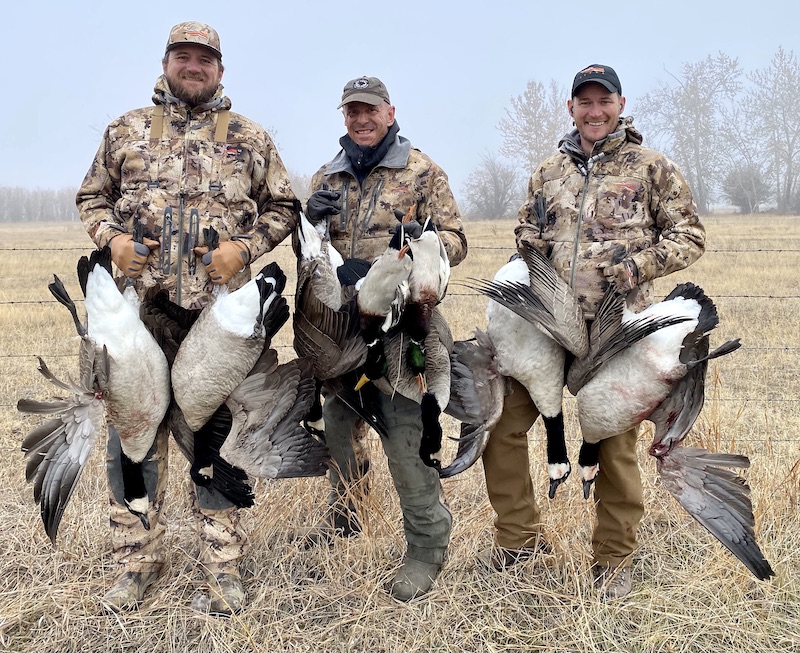
Brady Davis: That was a first for me, today. Sitting in the field, set up, and here comes a farmer with a plow and a tractor. Just goes straight to work and makes a pass or two on the far end of the field, and we’re kind of watching him.
Ramsey Russell: We were all wondering, this morning, why that one pass was right there on our side of the field. Like, “I wonder why he did just this wheat?” Then he came back to get started, saw us, and turned back the other way. I figured he was going back to the barn. Hell, no. He started going and coming to us. I couldn’t believe how fast he was coming.
Matt McCormick: That’s what I kept saying.
Ramsey Russell: Man, we were running, picking those decoys up. This guy was gaining on us.
Brady Davis: He had that John Deere on tracks. I had never seen one go that fast. That joker was turning dirt and burning diesel fuel.
Matt McCormick: Yeah.
Brady Davis: As fast as I could go.
Matt McCormick: I think that was fourteen inches he was digging, trying to get that frost line deep for the potatoes. Fourteen inches he was deep, and he was going that fast.
Ramsey Russell: He was going that fast. It said a lot to me about him, and about maybe the people around here, that he got off the tractor, came up, and apologized. Said, “I’m terribly sorry. I just got to get this in before this weather hits.”
Matt McCormick: Yeah.
Brady Davis: Yeah.
Ramsey Russell: But he was apologetic.
Brady Davis: Yeah.
Matt McCormick: Oh, absolutely.
Brady Davis: Great guy.
Matt McCormick: Yeah. He’s a good guy. That family is great, and they’re just trying to make an honest living. They want us out there. They want us doing it, and they love it that we are. But he’s got work to do too, and we’re out there playing.
Toughest thing about Canada goose hunting in Montana?
So the frost can be next-level. In the right conditions, the frost can be incredibly next-level to the point where you put out decoys and leave single-slot bags over the decoys until it’s time to go.
Ramsey Russell: What do y’all think is the number one hurdle—or difficulty, or the real tough spot—about hunting in this part of the world [Montana]? About that goose hunting. Is it the wind? Is it the cover?
Brady Davis: I think in this valley—if you’re talking about the technicalities of the goose hunting—I would say it’s a lack of wind, and sun.
Ramsey Russell: Hard to steer them.
Matt McCormick: Frost.
Brady Davis: Frost.
Matt McCormick: We just get really cold, stale weather. We’ll get those high-pressure systems move in, and they’ll just sit on top of us. Our low-pressure systems that bring snow—they come in, they dump snow, and they get out. A day and a half, two—dump a bunch of snow. We’ll have two feet on the ground, then it’s gone. High-pressure? Cold. No wind. That just creates really unique challenges. It makes it hard to hide. It puts those geese way up off the roost, so you’ve got to break them down. It can be really tough. That’s where the finesse game really comes in.
Brady Davis: The other thing I will say real quick is that—when you look at our weather, and you’re looking at the metrics of the weather in the winter—we get fairly humid. I know there’s a lot of parts in the country that get way more humid than we do, but we do get fairly humid for the West. So the frost can be next-level. In the right conditions, the frost can be incredibly next-level to the point where you put out decoys and leave single-slot bags over the decoys until it’s time to go.
Matt McCormick: Until the first flock.
Brady Davis: Until the first flock. You literally burn a flock with a whole decoy spread set out with single slot bags draped over the decoys. As soon as those first geese come in, you burn them, and they flare out. Then you’re out there pulling bags as quick as you can. At that point, you’re hoping they just keep coming, because you don’t have frost for a bit.
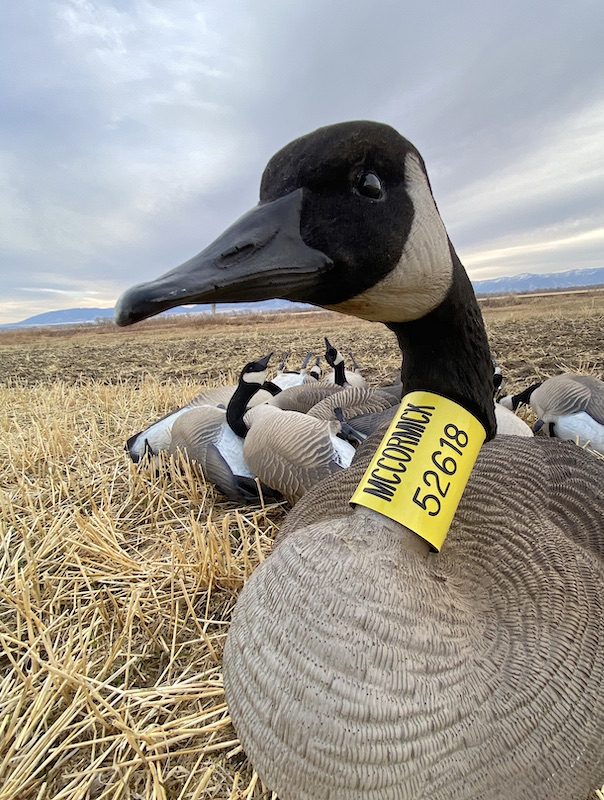
Ramsey Russell: Well, I noticed this morning, when you laid the spread out, you were laying them in the bag. You were laying the bag decoys out, and I was going behind you and staking. And that’s why.
Matt McCormick: Yeah. First of all, that’s the most efficient way to set out the single-slot bags, but that is another reason. Yeah, just having them out. What we’ll do in the situation that we’re talking about, with the frost, is we’ll actually put them on a stake or stand, usually, in that scenario. We’ll put them on the stand, and then we’ll take that bag and we’ll drape it right over the top so that it gets on the bag, not the decoy. Then we’ll pull the bags off when the geese start flying.
Brady Davis: Because we have no wind, the bags don’t blow away.
Ramsey Russell: Yeah. Makes a big difference, doesn’t it?
Matt McCormick: Yeah. I did an Instagram post the other day about blowing snow off the decoys. We use a snow blower or a leaf blower. That helps blow the snow off the decoys when you’re getting heavy downpour snow. There were some guys that were really chiming in on different solutions that they had to that problem. We haven’t tried it yet, but the one that I’m really most interested in is, Rooster was talking about—I think it was antifreeze. I don’t know what that will do to one of the decoys, and we just need to try it. He was talking about spraying them down with a spray of antifreeze. That’ll help hold for an hour or two, and it’ll keep that frost off. Which could be a really handy trick.
Ramsey Russell: I bet you could use that windshield wiper fluid that’s got a little of that stuff in it. It would be a little more dilute, but I bet it would work.
Matt McCormick: Yeah.
Canada Goose Hunting pressure around Bozeman, Montana?
I feel like I moved here at the tail end of the Canada goose hunting heyday, right? Fast-forward to today, six years later: it’s an entirely different game.
Brady Davis: Just anything, because those are the challenges, from a technical aspect, we run into here. The stuff that we’re talking about. When I first moved here and was first hunting with Matt, we were in a position where, literally, if we found a feed of geese, I’d say we were about 90% to get permission and be able to hunt it. There were really only one or two other crews running around hunting geese in this valley. I feel like I moved here at the tail end of the Canada goose hunting heyday, right? Fast-forward to today, six years later: it’s an entirely different game. It is. There are a bunch of people hunting. Which is great, right? I don’t think it’s a bad thing. There’s a bunch of college kids that come here for school, and they moved to Bozeman to come to MSU, because it’s Bozeman. They moved here for the same reasons we did.
Matt McCormick: And there’s a bunch of guys like us that are out of college that are just ready to—
Brady Davis: Yeah. I don’t begrudge them for it. I think it’s great that guys are out hunting, but it has become exponentially harder—over the six years that I’ve been here—to find geese, get permission—
Matt McCormick: And kill them.
Brady Davis: And kill them. There’s way more pressure. The birds are getting beat up. We don’t have that many big roosts in this valley, either. The other thing is, I think sometimes because of the photography, guys like Matt and these other photographers that are taking photos—especially for SITKA Gear, they know SITKA Gear’s based in Bozeman—these guys get all these kickass goose hunting images that look sexy, with mountains and lots of geese. I think people think Bozeman’s a great spot to hunt geese. The truth is that our valley, at its peak, does not hold that many birds. It’s a fairly big valley, and I’d be blown away if we ever filled up and had seven thousand birds.
Ramsey Russell: Wow.
Brady Davis: I think we’re probably closer to four or five. From an outsider looking in, when people look at all this beautiful imagery—and Bozeman breeds that, right? This is the hotbed for photographers and guys that are wanting to do what Matt does. They see that, and they think, “Oh, Montana,” and it kind of naturally transitions their mind to Bozeman because they know we all live here, and we’re hunting here, and they think it’s great. But the truth is—and I don’t say this to deter anybody. If anybody wants to come hunt here, they should absolutely do it. But in the six years I’ve been here, it has become way, way harder.
Matt McCormick: And just the urbanization of Bozeman. It’s growing. We’ve lost three farms just in the last few years. The city limits are growing. Somebody will call me out on this number, but I’m going to say it’s growing at least a half mile a year, if not a mile a year. That just changes things, man. It changes it.
Ramsey Russell: Yeah. Urban sprawl.
Matt McCormick: Yep, yep. It pushes you out, and the further out it gets—not only is your line that you can’t hunt further out, but it’s also people coming in and buying more stuff closer to town. Commercializing the outskirts and putting new subdivisions in that are outside of town. Or people that are just moving here, and they want to buy a little ranch. There’s 20 acres here, there’s a 160-acre field over here that’s for sale. They buy it, they put a house on it, and it’s no longer huntable. The guy still farms it; they’re just not into hunting. That has been a really big challenge for us.
Brady Davis: The other thing is: if you look at this valley—it’s basically like a big rectangle—on a map, Bozeman proper butts up to the mountains, so there’s really not a lot of urban sprawl going that direction. It’s all going west of Bozeman, and a little bit north of Bozeman, into the agricultural area. Because that’s where there’s land, right? That’s where there’s flat, good ground for development and subdivisions. As that moves west and north of Bozeman, that is where the geese are. It just pushes that. Again, circling back—like I said—at our peak here, you can take a fifty mile linear measurement in this valley. We don’t have but a few good goose roosts.
Matt McCormick: And half of them freeze.
Brady Davis: And half of them freeze. Then, when it gets dirty cold, they go to the river. There’s just not that many roosts. So when there’s a lot of guys out hunting, I don’t care if we’re on different fields. We’re beating up the same geese, and those geese figure out the game. It’s just becoming harder and harder to kill them here. I think it’s a great spot to come, and for everybody that has romantic notions of hunting in Bozeman: come on.
Ramsey Russell: But it’s not just goose hunting. There’s elk hunting, deer hunting, turkey hunting, fly fishing, mountain biking, snow skiing. My gosh, it’s a paradise of outdoor activity.
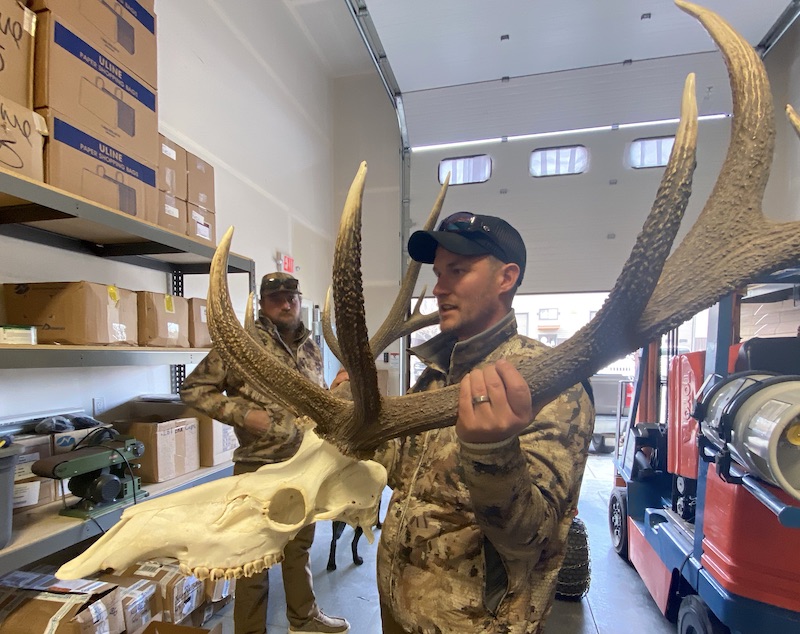
Matt McCormick: It really is.
Brady Davis: It would be a terrible spot to live if you didn’t like the outdoors.
Matt McCormick: Right. Especially with the cold. We get dirty, dirty cold. Part of the reason why we don’t have a lot of birds is our geographic location within the flyways. We have a really big main vein of geese that come down from Alberta and go straight to Salt Lake. There is a very clear path. Jump on a map if you want to find it. It is a very clear path, and they stay there. So we get spill-over from that. Really, what we get more of are the ones that are further outside of that, trying to get to it. We are a stopping point for them, so they’re actually moving.
Ramsey Russell: Birds coming from the East.
Matt McCormick: Coming from the East, going to the West to get to that vein and get back on track. We’re just a nice stopping point for them because, guess what? We do have food. We do have open water. That’s all they need. They can come here, and they can hang out. But the more they get beat up, the faster they’re going to leave. That’s the reason why we don’t have a ton. The inner mountain Canada goose population already isn’t giant, compared to further west and further east. You get into the Central Flyway over there in Dakotas, and it’s crazy with geese. You get all the way over there to the Pacific Flyway—like up against the coastal stuff—it is nutty with geese. We’re just stuck. Even eastern Washington, eastern Oregon, stuff like that—Idaho, Boise, all that stuff—gets a lot of birds. Those are not the same birds that we’re hunting. We’re hunting different geese, and our population just isn’t that strong, already.
Brady Davis: We don’t have a resident population.
Matt McCormick: Very, very small resident population.
Brady Davis: There’s a couple, but, for all intents and purposes, it’s non-existent.
Matt McCormick: Less than a thousand geese within a sixty-mile radius.
Ramsey Russell: That’s crazy.
Matt McCormick: Yeah. I think, like Brady said: if people want to come out and hunt here, it is a phenomenal, beautiful place. Good food. Great people. You’re going to find like-minded people. There’s going to be other hunters. You’re going to find people you like. There’s a lot of us, and we’re very welcoming. Like tomorrow, we’re going to spend a little time with some guys that also got permission on the same field that we’re going to be hunting, and we’ve never hunted with these guys before.
Brady Davis: Some of them we’ve never even met.
Matt McCormick: Yeah. That’s just part of it. You just got to adapt and overcome and work together, and it’s just all part of this deal.
Ramsey Russell: That is pretty cool. Rather than fighting and carrying on and getting hurt feelings, just work it out and hunt together
Matt McCormick: Oh, there ain’t no reason to get in an argument.
Ramsey Russell: It’s funny because we all kind of sort of knew each other, but then we met just randomly over there in North Dakota. But you said something the other day about Bozeman and about the people here. How there’s so much similarity. Like you get into any other community—my home community—you’ve got these cliques, but over here there’s so much commonality. You don’t know everybody, don’t run around with everybody. You know what I’m saying? You don’t gravitate towards any one clique because it’s all kind of one clique.
Goose Hunting, Work and Lifestyle in Bozeman, Montana
One of my favorite quotes—and I have it written down on my phone—it says “And then there is the most dangerous risk of all—the risk of spending your life not doing what you want on the bet that you can buy yourself the freedom to do it later.” – Brady Davis
Matt McCormick: Yeah. Everybody’s kind of the same, so you kind of just pick your people and run.
Brady Davis: What else? Well, the other thing that I think is really cool about here is, with our hunting groups and fishing and everything, and even in my business— I have a business here in Bozeman, and I rarely run into people who are from Bozeman. Everybody moved here for, more or less, the same reason. Whether they’re into goose hunting or not, it’s just the outdoors. They moved here to fly fish. They moved here to mountain bike, to hike, to do this. They darn sure didn’t move here for a phenomenal job, 99% of the time, right? We have a small economy.
Montana is a giant state with barely a million people in it. There’s not a giant economy here, so everybody moved here—the way I always describe it to people, when I’m telling them, is that people moved to Bozeman on purpose. Bozeman is not a spot where you get stuck. For one, it’s too expensive to get stuck here. It’s an incredibly high cost of living in this valley. People move here on purpose, and they’re usually gritty, outgoing, ambitious people who figure out a way to make it work, to stay. For me personally, those are the people that I’m interested in hanging out with. I like people that are doers and movers and shakers. People that are passionate about things in life other than just work and coming home and sitting on the couch and drinking beer.
Everybody that we know here—in our friend group, the group of people Matt and I hang out with, there’s a bunch of couples—everybody moved here from all over the country. From Mississippi, from Colorado, from Alaska and Idaho. All over, right? But we all came here for the same reason. We get here, and then we find these commonalities in and amongst ourselves. It’s really, really cool because you’re hanging out with people that came here— I feel like moving here, and making a life here, is kind of doing it the hard way. Again, it’s expensive. There’s not a lot of work. So those are interesting people. They’re people that are willing to make sacrifices in their lives in order to keep doing what they’re passionate about. I think those are people that fascinate me. In the waterfowl world, obviously, the guys that hunt hard are guys that make sacrifices in their life to do that. But, heck, I can sit at a restaurant or a bar with a ski bum, or somebody that’s here to fly fish—truth is that if they lived somewhere else and did it a different way, they could have a much easier, better life, financially.
Ramsey Russell: That’s a good ending point because it’s a point I’m trying to make. There’s more to life than making a living. You’ve also got to make a life.
Brady Davis: 100%.
Ramsey Russell: That’s something I know we all got in common, and I guess a lot of people. A lot of y’all’s friends up here.
Brady Davis: When I was living in South Carolina, I was working on the job, and I was working seven days a week. On paper, it looked great, but I was miserable. I wasn’t hunting, and I was just constantly dreaming about getting back out to the West. One of my favorite quotes—and I have it written down on my phone—it says “And then there is the most dangerous risk of all—the risk of spending your life not doing what you want on the bet that you can buy yourself the freedom to do it later.”
Ramsey Russell: Boy. You can take that to the bank.
Brady Davis: For me, I was in a position where I wasn’t hunting. I could have made a lot of money staying and doing what I was doing, but I wasn’t happy. And man, listen, tomorrow is not guaranteed. We had this conversation yesterday. We don’t know. God forbid something happens to the three of us tomorrow. I don’t want to grow old and spend my life working my butt off just on the off chance that, when I’m old, I get to go on some duck hunts and have some fun. People here are making a life. Like you said, Ramsey. I think that’s really cool.
Ramsey Russell: Take this morning. I thought it was an excellent game scouting program. Everything to a T. Boy, a lot of detail went into this morning spread, and I thought we had a great shoot. An average shoot by y’all’s words, not mine. A great shoot. It was a good shoot. If you can’t accept that, then what’s the point? Go do something you want. But we talked about this last night—I’m like, “I’m going.” Because every hunt I don’t go on is one less hunt I get to do, and that’s what I want to do. I want to go duck and goose hunt.
Brady Davis: 100%. It’s just fun hanging out, right? Last week, Matt and I were in North Dakota snow goose hunting. By all metrics, we got our asses handed to us. We saw hundreds of thousands of snow geese, and, in three days, we killed two snow geese. Driving back from that—I got to tell you, man, I had the time of my life. I’m hanging out with my pals. We’re driving around. We’re scouting. We’re telling jokes. We’re laughing. We’re eating gas station food and dirty bar food in the middle of BFE North Dakota. That’s phenomenal, man. I could die tomorrow and, if I had to look back on last week, I would say it was a smashing success. I had the time of my life. I like hanging out with people that want to go do those types of things, and that’s one thing I’ve obviously—being friends with Matt—I’ve appreciated. It’s great having buddies that are on the same page, that are willing to do things that—we don’t always kill geese, man. There’s plenty of hunts we go on where we get just roasted.
Matt McCormick: But you learn from it.
Brady Davis: You learn from it, and it makes you better. Then you do have those good ones, man, and it’s a barn burner, and it’s fun. But you said it best today, Ramsey, when we were talking. I think we’d killed ten, whatever birds we killed today. The truth is, killing another ten today would not have increased my experience. It’s the first time I ever got to hunt with you. We laughed. We hung out. We had a good time. You got to run your dog. Char’s a cool little dog, by the way.
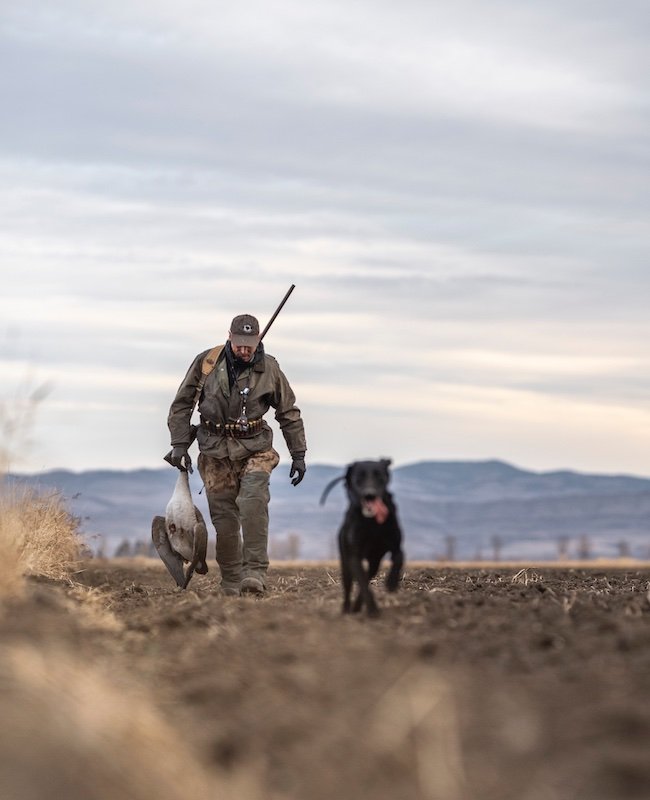
Ramsey Russell: Ted Wells told some good jokes.
Brady Davis: Yeah. That’s what it’s about, right?
Ramsey Russell: It’s like the farmer came up—we’re out there having fun, he’s trying to make a living. One more bird, ten more birds, fifty more birds. It wouldn’t make a damn bit of difference. You know what I’m saying? It really wouldn’t have changed the way I felt about myself, about my friends, about the hunt. I just had a great time. We’ll get them tomorrow or the next day.
Brady Davis: I think people get just so hung up on, “You just gotta kill them. You gotta kill them. You gotta kill them.” Listen, we all love that as much as anybody, but, goddang, I can have just as much fun— I mean, we did in North Dakota. Put out a giant spread of decoys and get your ass handed to you. We laughed the whole time. I was in a great mood, picking up decoys, and it was hilarious.
Matt McCormick: Get back in the trucks and start scouting.
Brady Davis: We went scouting again. Heck, I love driving around scouting. Especially when you got a pal in the truck with you, and you’re not alone. It’s fun.
Ramsey Russell: Absolutely. How can people get in touch with y’all on social media if they wanted to? I’m sure they would. How would they connect with y’all on Instagram or wherever?
Matt McCormick: Yeah. Reach out to our handles. They’re really easy to remember. @MattMcCormick05 and @BradyDavis406. If you find one of us, you’ll find us both.
Brady Davis: Yeah. Most of the photos that I post, Matt probably took. We’re tagged in each other’s ones, and we’re hunting and fishing together.
Matt McCormick: Yeah, reach out anytime.
Brady Davis: Hit us up.
Matt McCormick: We encourage people to reach out if they’ve got questions about photography, questions about decoys, questions about strategy. We’re thinking about all this stuff every day, and I know everybody else is too. If anybody’s got questions, they can always reach out. We’re really easy to get ahold of. Sometimes it may take a little bit, but we’ll get back to you. That’s one thing for sure. We will absolutely be honest about what’s going on and what our thoughts are. Reach out at anytime.
Brady Davis: Or if you see something we’re doing that you think you got a better idea—also reach out, because I want to learn.
Matt McCormick: Absolutely.
Brady Davis: Guys around the country know more, and it’s cool. That’s one thing I love about the waterfowl community is that it’s a pretty tight-knit group. People share information, and it’s fun, man.
Matt McCormick: The other thing that I’d say is, when people are coming to Bozeman—and we do get this a fair amount—but when people are coming to Bozeman or coming to Montana, feel free to reach out. If they want to come and get together for a hunt—you and your buddy are taking a road trip and you’re going to go try it out, you’re going to go do the Canyon Ferry deal, or you’re going to get on the Missouri and try something—we can at least point you in the right direction if we can’t join you, too. We usually have some spots open, as well.
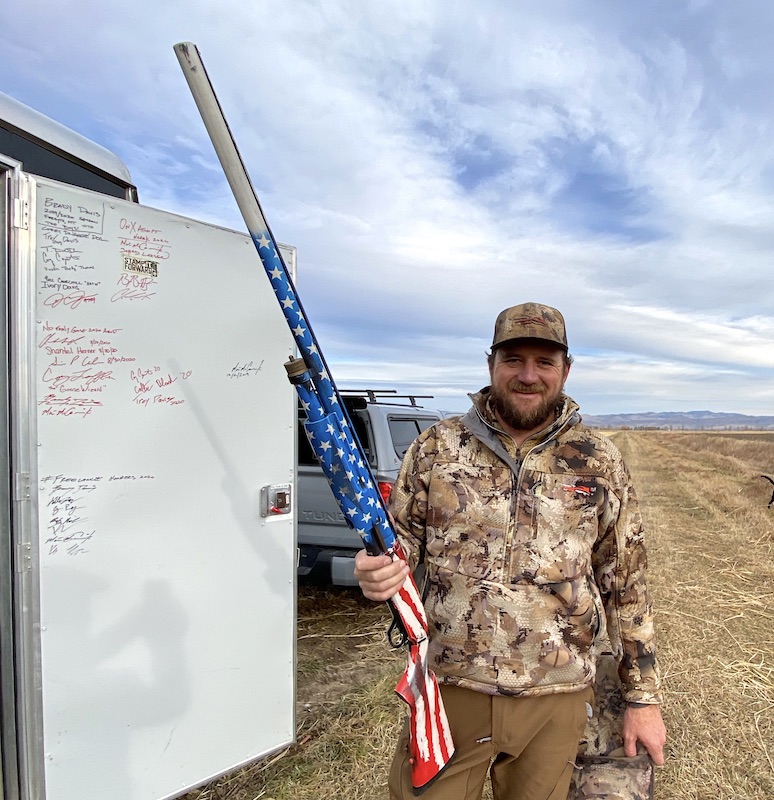
Brady Davis: Hit us up. Let’s go hunting. We can shoot some 10-gauges.
Ramsey Russell: Oh, boy. Y’all fold geese like ragdolls with those 10-gauges.
Brady Davis: They’re effective.
Matt McCormick: They certainly are.
Ramsey Russell: Folks, thank y’all for listening to Duck Season Somewhere, from the Gallatin River Valley in Montana. We’ve been listening to Brady Davis and Matt McCormick. Life’s Short, Get Ducks. We’ve all got to make a living, but be sure to make a life. In Montana and elsewhere.




